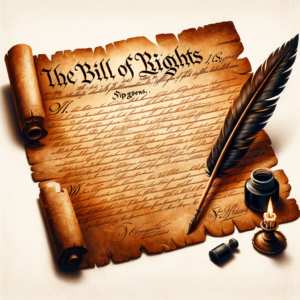Unraveling Democracy: The Alarming Rise of Constitutional Challenges
[caption id="attachment_71156" align="alignnone" width="638"] Bill Of Rights[/caption]
In recent years, the global political landscape has witnessed a troubling trend: the alarming rise of constitutional challenges that threaten the very foundations of democracy. As nations grapple with complex socio-political issues, the integrity of constitutional governance is increasingly under scrutiny. This article delves into the intricacies of democratic principles, the current surge in constitutional challenges, and the multifaceted factors contributing to the erosion of democratic norms, while also highlighting the critical role of the judiciary and proposing strategies to fortify democracy against these threats.
Understanding the Foundations of Democracy and Constitutional Governance
Democracy is fundamentally rooted in the principles of popular sovereignty, political equality, and the rule of law. At its core, constitutional governance serves as the framework that delineates the powers of government, protects individual rights, and ensures accountability. Constitutions are designed to be living documents that adapt to the changing needs of society while safeguarding the rights of citizens against potential abuses of power. The interplay between democratic ideals and constitutional frameworks is essential for fostering a political environment where citizens can actively participate in governance, thus reinforcing the legitimacy of political institutions and the trust of the populace in their leaders.
The Current Landscape: Analyzing the Surge in Constitutional Challenges
The past decade has seen a marked increase in constitutional challenges across various democracies, with political actors frequently questioning the legitimacy of established norms and institutions. This surge is characterized by a growing trend of populist movements, which often exploit public discontent to undermine constitutional checks and balances. In many instances, leaders have sought to consolidate power by circumventing constitutional provisions or manipulating legal frameworks to their advantage. This has resulted in a climate of uncertainty, where the rule of law is increasingly perceived as malleable, and the very essence of democratic governance is called into question.
Key Factors Contributing to the Erosion of Democratic Norms
Several interrelated factors contribute to the erosion of democratic norms and the rise of constitutional challenges. Economic inequality, social fragmentation, and the proliferation of misinformation have created fertile ground for political polarization and disillusionment with traditional political institutions. Additionally, the rapid advancement of technology has transformed the ways in which information is disseminated, often amplifying extremist views and undermining the public's ability to engage in informed discourse. As citizens become more susceptible to manipulation, the stability of democratic governance is jeopardized, leading to a cycle of constitutional crises that further exacerbate societal divisions.
Case Studies: Notable Instances of Constitutional Challenges Worldwide
Around the globe, numerous case studies illustrate the precarious state of democracy in the face of constitutional challenges. In Hungary, Prime Minister Viktor Orbán has systematically dismantled democratic institutions, undermining the judiciary and curtailing press freedoms under the guise of national sovereignty. Similarly, in Brazil, former President Jair Bolsonaro's administration faced accusations of undermining democratic norms through attempts to delegitimize electoral processes. In the United States, the aftermath of the 2020 presidential election saw unprecedented challenges to the electoral system, culminating in the January 6 Capitol riot, which highlighted the fragility of democratic institutions even in long-established democracies. These examples underscore the urgent need for vigilance and proactive measures to safeguard constitutional governance.
The Role of the Judiciary in Upholding Democratic Principles
The judiciary plays a pivotal role in upholding democratic principles and ensuring that constitutional governance is maintained. Courts serve as guardians of the constitution, interpreting laws and adjudicating disputes that arise between the state and its citizens. An independent judiciary is essential for providing checks and balances on executive power, protecting individual rights, and fostering public confidence in the legal system. However, in many instances, judicial independence is under threat, as political leaders seek to exert influence over judicial appointments and decision-making processes. Strengthening the judiciary's autonomy and capacity is crucial for preserving the rule of law and reinforcing democratic norms in the face of rising constitutional challenges.
Strategies for Strengthening Democracy Against Constitutional Threats
To counter the alarming rise of constitutional challenges, a multifaceted approach is necessary. First, enhancing civic education and public awareness about democratic principles can empower citizens to actively engage in the political process and hold their leaders accountable. Second, fostering dialogue and collaboration among diverse political factions can help bridge societal divides and promote a culture of consensus-building. Third, strengthening institutional frameworks that protect the independence of the judiciary and the media is vital for ensuring that democratic norms are upheld. Finally, international cooperation and support for democratic movements can provide crucial resources and solidarity for nations facing constitutional crises, reinforcing the global commitment to democratic governance.
The rise of constitutional challenges presents a formidable threat to democracy worldwide, necessitating urgent action to safeguard the principles of constitutional governance. By understanding the foundations of democracy, analyzing the current landscape, and addressing the key factors contributing to the erosion of democratic norms, societies can better equip themselves to confront these challenges. The judiciary's role as a protector of democratic principles cannot be overstated, and proactive strategies must be implemented to strengthen democracy against the tide of constitutional threats. In doing so, we can aspire to create resilient democratic systems that uphold the rights and freedoms of all citizens.
